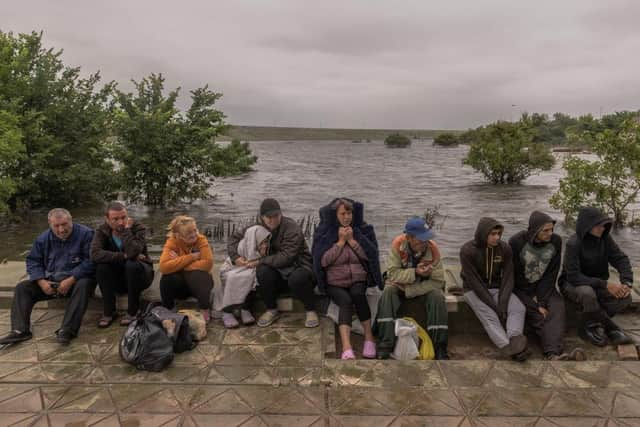War against Ukraine: Scottish-led investigation finds it is 'highly likely' Russia was responsible for Ukraine dam attack
It is "highly likely" Russia was responsible for the Ukraine dam attack, according to a Scottish-led human rights law firm supporting Ukraine’s Office of the Prosecutor General.
Hundreds of thousands of people were affected by the destruction of the Kakhovka dam and hydroelectric power plant in eastern Ukraine on June 6. Flooding spread across a large area, forcing people out of their homes and destroying the local eco-system. It is believed around five people died in the floods, with others killed during shelling attacks while people attempted to evacuate the area by boat.
Advertisement
Hide AdAdvertisement
Hide AdBoth Russia and Ukraine have each accused the other of creating an explosion that caused the breach in the dam.


An investigation by Global Rights Compliance said there was a high probability the collapse of the dam was caused by explosives positioned at critical points within the dam’s structure.
The dedicated unit supporting Ukraine’s Office of the Prosecutor General into the investigation of Russian starvation war crimes has released initial findings into the dam’s collapse.
Glasgow-born barrister Catriona Murdoch, who is leading the investigation, warned there was a “calculated plan to starve, terrorise and force the capitulation of Ukrainian people, no matter the human cost”.
She said those conducting the attack or overseeing the management of the dam would require access or control of the site, which has been controlled by Russia since it took over part of the region in February last year, increasing likelihood of Russian instigation.
Ms Murdoch, partner and head of starvation portfolio at Global Rights Compliance, said: “Information available to Global Rights Compliance and verified with a leading Open-Source Intelligence provider, indicates that at this stage, it is highly likely Russian forces deliberately destroyed the dam. Our evidence and analysis suggests that it is unlikely that mismanagement alone would explain such catastrophic destruction. Instead, we find there is a high probability the collapse of the dam was caused by pre-emplaced explosives positioned at critical points within its structure.
“The damage to the Kakhovka Dam speaks to a broader, ongoing pattern to terrorise, deliberately starve and punish the Ukrainian people, no matter the cost to human life. Given the patterns of attacks against water infrastructure and installations we have been documenting, coupled with the ease with which Russian forces have attacked other objects indispensable to the survival of civilian populations, including in Chernihiv and Mariupol, the destruction of Kakhovka Dam appears to be part of an ongoing and deliberate pattern of attack against civilian objects.”
Investigators say a “floating death” also now plagues Kherson, as the onrush of water from the collapsed dam has uprooted many thousands of unexploded landmines planted by the Russians in retreat from the occupied territories. This is putting civilians and civilian infrastructure at further, lethal risk.
Advertisement
Hide AdAdvertisement
Hide AdYousuf Syed Khan, senior lawyer at Global Rights Compliance and part of the delegation visiting the site last week, said the impact of the disaster would be felt “for years to come”.
He said: “What we documented in Kherson is a horrific starvation crime. The reverberating effects of this attack are no doubt immense, far-reaching, and multi-generational, as entire industries and livelihoods related to agribusiness have been severely affected.
“The devastation wrought by this disaster cannot be overstated.”
Comments
Want to join the conversation? Please or to comment on this article.
